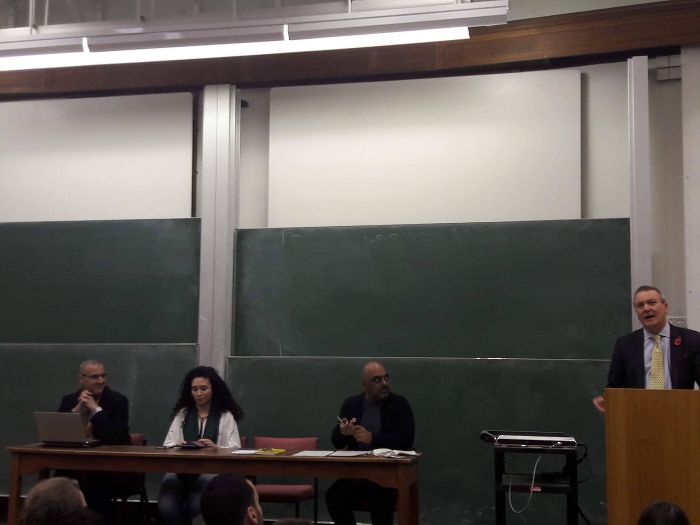The censoring of the PalSoc debate in a free university is unacceptable
After the University imposes its own ‘neutral’ chairperson in a PalSoc debate, replacing SOAS’s Dr Ruba Salih, Francesco Anselmetti and Beth Craig-Geen say that the delegitimising of the Palestinian cause cannot continue

Over the course of the last month, fundamental questions have been raised about the ability of both staff and students in our University to conduct rigorous practice and productive, independent dialogue. While inexcusable, both the Telegraph’s coverage of the decolonisation initiative and La Repubblica’s ad hominem attack on Giulio Regeni’s supervisor do not come as a surprise if we consider the susceptibility of the national and international media to political agendas and private interests. What marks last Wednesday’s events as particularly disturbing and insidious is that action by the University itself has now prevented the academic freedom of its students.
Last week, an event on the Boycott, Divestment and Sanctions (BDS) movement, which aims to stop the building of illegal Israeli settlements, was threatened with cancellation by the University if the panel’s chair, respected academic and woman of colour Dr Ruba Salih, was not replaced with with a ‘neutral’ member of University staff. The venue in Mill Lane Lecture Rooms had been booked weeks in advance and approved with a full Prevent (the government’s ‘anti-extremism’ initiative) assessment, but the organisers were presented with this ultimatum a mere seven hours before the event.
“This transparent attempt to shut down free academic activity… should be opposed by all”
The University cited the need to protect the freedom of speech of ‘both sides’ of a debate which they described as “controversial”, and the opposition they had received to it in the form of a letter campaign from well-known pro-Israeli group StandWithUs. In their public statements, however, they present as their reasoning a decontextualised question from the organisers as to whether security would be present (given the precedent set for this the last time panellist Omar Barghouti spoke), claiming that the organisers requested extra security.
This authoritarian intervention in a student-organised event promoting the human rights of Palestinians and other marginalised groups around the world could be viewed in one of three ways. At best, it is a feeble attempt to avoid engaging in academic discussion on a controversial subject for fear of bad publicity – something that has severely backfired this week, with an open letter condemning the University’s actions signed by over 500 members of the global academic community and publicised in national and international press.
It could also indicate, however, a concerning example of the University’s application of the government’s counter-productive Prevent policy, which has been condemned by various studies conducted by organisations from Human Rights Watch to the United Nations for infringing on freedom of speech, privacy and leading to racial profiling – all issues which are pertinent in this case. This transparent attempt to shut down free academic activity, and to delegitimise the cause of the meeting in question – that of freeing Palestinians from Israeli occupation – should be opposed by all.
The justifications behind the University’s policing of the event are intimately linked with the framing of pro-Palestinian activism as ‘contentious’. This framing can be seen as dangerously close to linking opposition to the state of Israel’s illegal occupation of Palestinian land with anti-Semitism. However, there is little that is contentious about wanting to promote the human rights and self-governance of Palestinians.
The Israeli Professor Moshé Machover has recently commented on the link between the manufacturing of this obstinate criticism and the international decline in the support of Israel’s settler colonialism: “What is remarkable is that among the BDS activists there is an overrepresentation of young Jewish people. That is very worrying for the Zionists and if you read the Israeli press it is clear that there is a determination to halt this erosion of support for the Zionist state by discrediting its critics.” Through its measures, the University is adding to this discrediting, in the same way that the Prevent policy thoughtlessly associates pro-Palestinian causes with religious fundamentalism.
Groups opposed to the policies of the state of Israel are heterogenous. In the words of Palestinian activist Omar Barghouti, the coalition that forms the BDS movement “agree on its three main goals, and basically nothing else”. Just how the consensus around the ending of Israel’s hold of occupied land, the recognition of the fundamental rights of Arab-Palestinian citizens of Israel, and the right to return of Palestinian refugees as stipulated by UN Resolution 194 constitutes ‘radical belief’, and can be used to shut down students’ academic freedom, is frankly beyond our comprehension
 News / Uni Scout and Guide Club affirms trans inclusion 12 December 2025
News / Uni Scout and Guide Club affirms trans inclusion 12 December 2025 News / Cambridge Vet School gets lifeline year to stay accredited28 November 2025
News / Cambridge Vet School gets lifeline year to stay accredited28 November 2025 News / Cambridge study finds students learn better with notes than AI13 December 2025
News / Cambridge study finds students learn better with notes than AI13 December 2025 Science / Did your ex trip on King’s Parade? The science behind the ‘ick’12 December 2025
Science / Did your ex trip on King’s Parade? The science behind the ‘ick’12 December 2025 News / Pembroke to convert listed office building into accom9 December 2025
News / Pembroke to convert listed office building into accom9 December 2025








